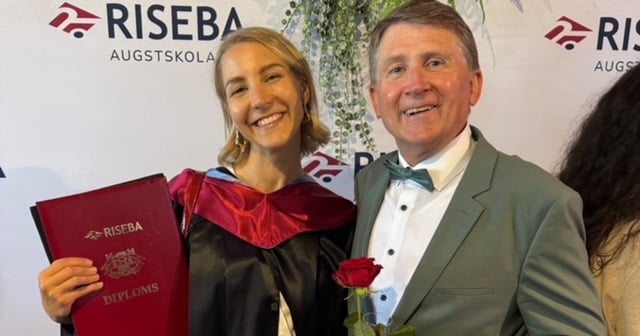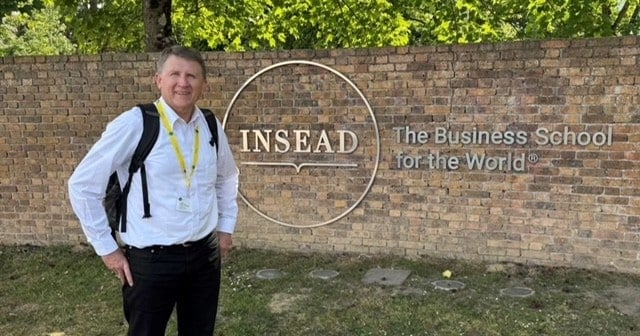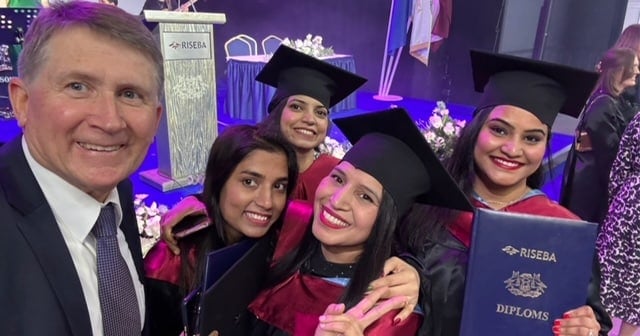Beyond Numbers: Understanding Business with Karlis Atrens

Most business programmes promise global opportunities. Few actually deliver.
At RISEBA in Riga, Karlis Atrens leads a study programme that does not just talk about international careers – it builds them. With double degree options, a multicultural environment, and a strong focus on real-world experience, the International Business programme is designed for students who want to go further. We sat down with Karlis Atrens who moved from Australia to Latvia and built his career across industries to talk about what makes the programme different, what kinds of students thrive here, and why sometimes your biggest breakthrough starts during an internship.
You moved from Australia to Latvia. What brought you here and how did it change your career?
It was a big decision, but a very intentional one. My wife and I wanted our kids to grow up in Europe, in a young democracy full of opportunity. It meant taking a risk – I had to succeed professionally to make it all work. Luckily, I was able to continue my career in IT management here in Latvia. It wasn’t always easy, but it opened doors I wouldn’t have found otherwise.

You began in IT. How did you end up running a business programme?
After moving to Latvia, I worked as an IT director while also pursuing an MBA. That’s when I started teaching part-time and something clicked. Over time, teaching became more than just a side job. It grew into a passion, and eventually into my role as Programme Director in RISEBA. I didn’t plan it that way, but I’m glad it happened.
Was there a specific moment that shifted your career?
I would say that the most life-changing one is getting a scholarship to study in Buffalo, New York in 2021. That experience refreshed my technical skills and gave me a whole new perspective on education. It was my first real step into academia, and it made me realize how much I enjoy helping others grow.
Lifelong learning – overused buzzword or real necessity?
To me, it’s about staying relevant. The world changes fast and if you don’t keep learning, you fall behind. I’ve always looked for ways to grow, especially in business and entrepreneurship and I think that this mindset has kept me curious and needed no matter what role I’m in.
How would you sum up the International Business programme in two sentences?
It’s practical, international, and designed for people who want more than theory. We give students a strong academic foundation, but also real experience through internships, teamwork, and projects.

What makes this programme different from others in Latvia or Europe?
First of all, it’s fully in English. That attracts students from all over and prepares them for international careers. We also offer double degree options with schools in France and Germany, and we regularly bring in lecturers from abroad. That global perspective makes the biggest difference.
What kind of students tend to do well in the programme?
The ones who are curious. Who are eager to explore and who aren’t afraid to show their voice. If you’re proactive and willing to get involved, you’ll get a lot out of the experience.
What’s the teaching style like? More theory or hands-on?
It’s a mix, but definitely leaning toward hands-on. Our lectures are interactive and fast-paced. Students work on real-world problems, in teams, and apply what they learn immediately. We want to encourage them to think, not just memorize.
You have emphasis on internships and teamwork in the programme. Why?
Because that’s how business works. Internships connect students to the real world and often inspire their thesis topics. Teamwork is everywhere: in class, in projects, and in careers. We try to prepare them for what’s waiting after graduation.
If you had to pick the top three soft skills for international business right now, what would they be?
Communication, empathy, and the ability to work across cultures is key. You can learn technical skills, but soft skills are what really move you forward in business especially in global teams.
How international is the programme in practice?
Extremely. Classes are in English, students come from many countries, and we offer mobility through ERASMUS+ and double degree partners. We also bring in international lecturers with different teaching styles and business experience. It’s a global environment in the heart of Latvia.

What kind of career paths do your students typically follow after graduation?
There are many choices – marketing, logistics, sales, trade, entrepreneurship. Some start their own ventures, some continue their studies abroad. The programme gives them a strong base, but also a network that helps open doors later on.
The job market keeps changing. How do you help students prepare?
We teach adaptability. Students learn to be resourceful, to think critically, and to work with people from different backgrounds. Those are the skills that help you navigate change no matter where you end up working.
In a world hooked on TikTok and short-form content, can students still engage with deep theory?
They can, if it’s presented in a way that feels relevant. Today’s students are used to fast information, but we also push them to slow down, take time to think and that’s where books come in.
Speaking of books, what is a must-read for business students?
“1984” and “Animal Farm” by George Orwell. They’re not business books, technically, but they teach you a lot about power, leadership, and what to avoid when building systems or organizations. Every business leader should read them.
Biggest misconception about studying business?
That it’s all about numbers. It’s not. Business is about people – understanding them, leading them, empathizing with them. Once you get that, everything else falls into place.